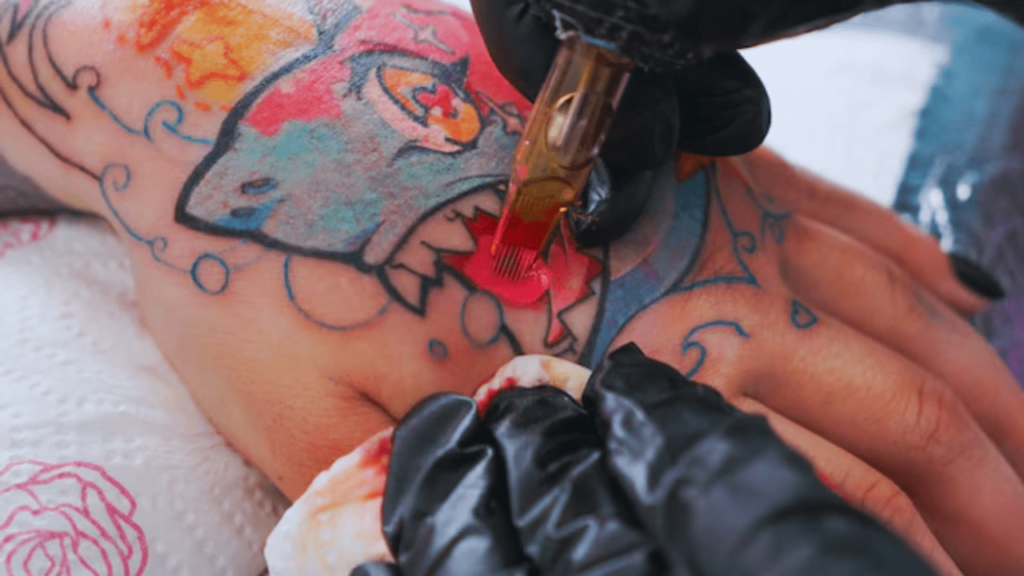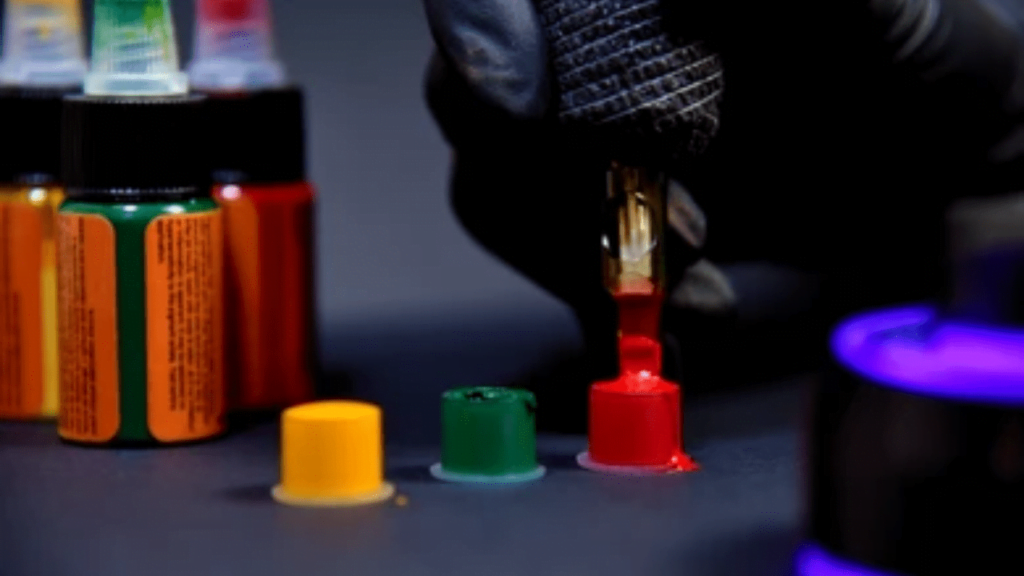The FDA’s investigation on contaminated tattoo ink highlights an important but long-ignored public health concern.

Tattoos have become an increasingly popular form of self-expression, with an estimated 32% of people in the United States sporting at least one. However, a recent study by the US Food and Drug Administration (FDA) has uncovered a concerning issue: many commercial tattoo and permanent makeup inks are contaminated with bacteria. This revelation raises significant health concerns for those considering getting inked.
Unveiling the Contamination
The FDA’s groundbreaking research, published in the journal Applied and Environmental Microbiology, tested 75 unopened and sealed bottles of tattoo and permanent makeup inks from 14 different manufacturers. The results were startling: about 35% of the products were contaminated with bacteria. This study is the first of its kind to systematically test these products for microbial contamination.
The study found both aerobic bacteria, which require oxygen, and anaerobic bacteria, which thrive in low-oxygen environments like the dermal layer of the skin. These findings highlight the potential risks associated with contaminated tattoo inks, as these bacteria can cause infections and serious health complications.
The Dangers of Contaminated Ink
When tattoo ink is contaminated with bacteria, it poses a risk of infection at the injection site. Linda Katz, director of the FDA’s Office of Cosmetics and Colors, explained that pathogens or harmful substances in these inks can spread to other areas of the body from the injection site via the lymphatic and circulatory systems. This can lead to severe health issues, including endocarditis, a potentially deadly inflammation of the heart lining, and septic shock, the most serious sepsis stage, which may cause multiple organ failure.
The more commonly reported symptoms of tattoo ink infections include injection-site rashes, impetigo (a highly contagious bacterial skin infection), erysipelas, a skin rash that is bright red and sensitive, and cellulitis, a skin infection that is deep and needs antibiotic therapy. People with multiple or large tattoos are at higher risk from contaminated ink, as larger tattoos increase the likelihood of exposure to microorganisms.
Permanent makeup, especially around the eye area, may pose a higher risk. Microbes could enter the eye and cause infections, potentially leading to severe complications.

A Call for Continuous Monitoring
Seong-Jae (Peter) Kim, a microbiologist staff fellow at the FDA’s National Center for Toxicological Research and corresponding author of the study, emphasized the importance of continuously monitoring tattoo inks to ensure their microbial safety.
The researchers discovered 34 bacterial isolates divided into 14 genera and 22 species. 19 of them were found to be potentially harmful bacterial strains. Two species, Cutibacterium acnes, and Staphylococcus epidermidis, were isolated under anaerobic conditions, while Staphylococcus saprophyticus and C. acnes were found in the same ink samples, indicating the presence of both aerobic and anaerobic bacteria.
Bacteria such as Candida acnes and Staphylococcus epidermidis are known to cause skin infections and other issues, which highlights the risk to anyone getting permanent cosmetics or tattoos. The results emphasize the need for efficient and accurate microbial detection methods for tattoo inks to streamline the monitoring process and prevent future contamination.
Industry Response and Recommendations
The tattoo industry is increasingly collaborating with regulatory agencies to guarantee compliance with safety regulations. Selina Medina, director of research at the Alliance of Professional Tattooists, noted that manufacturers are investing in advanced sterilization technologies and formulation advancements to improve production environments and reduce the risk of contamination. Using clean rooms and improved quality control procedures are part of this.
Certified tattoo artists are also taking steps to avoid contamination. Transparency with clients is vital, and artists should communicate openly about the steps they take to ensure ink safety. Some artists and studios conduct their own testing or require proof of testing from suppliers, including microbial testing to detect potential contamination.
Additionally, artists can resterilize inks before application by using an autoclave, a machine that utilizes steam to apply high pressure and temperature to items to eliminate bacteria. Proper handling of ink during the tattooing process is crucial, and artists should ensure ink bottles are tightly sealed when not in use and stored in cool, dry locations away from direct sunlight.
The Need for Regulation
The consensus among experts is that the best course of action would be to impose controls on the tattoo and permanent ink production industries, requiring testing and certification prior to allowing inks to be sold. The Modernization of Cosmetics Regulation Act (MoCRA) of 2022 is expected to bring significant changes to the regulation of tattoo inks in the US.
In June 2023, the FDA published proposed guidelines for the tattoo industry that outlined how producers should carry out quality control procedures, such as sterilization.
Infectious disease expert Dr. Robert Schooley from the University of California, San Diego, emphasized that the level of bacteria in materials injected into the skin should be zero. The fact that many inks failed bacterial sterility tests suggests that other organisms like viruses and fungi could also be present.
Protecting Yourself
For those considering getting a tattoo, it is essential to be aware of the potential risks and take steps to protect yourself. Ensure that the tattoo artist uses sterile equipment and follows proper hygiene practices. Ask about the safety measures they take to prevent ink contamination and whether they conduct their own testing or require proof of testing from suppliers.
Choosing a reputable tattoo studio that prioritizes health and safety can significantly reduce the risk of infection. Be informed and cautious, and remember that your health should always come first when deciding to get a tattoo or permanent makeup.
A Quick Review
The FDA’s study on tattoo ink contamination sheds light on a significant public health issue that has long been overlooked. With the rise in popularity of tattoos, it is crucial for both consumers and industry professionals to be aware of the potential risks associated with contaminated inks. Continuous monitoring, stringent regulations, and proper safety practices can help ensure that tattoos remain a safe and expressive art form for all.
Read Next:

The Psychology of Love: Why Valentines Day Matters More Epic Than You Think
Discover the psychology of love and why Valentines Day is more important than you think. Learn how love impacts the brain, strengthens relationships, and boosts

Premier League Highlights: Arsenal Humiliate Man City 5-1, Spurs and Palace Secure Crucial Wins
Arsenal demolished Manchester City 5-1 in a statement premier league highlights win, reigniting their title hopes. Meanwhile, Crystal Palace stunned Man United 2-0, and Tottenham

How Budget 2025 Impacts the Indian Middle-Class: Major Tax Benefits and Glaring Omissions
Budget 2025 offers major tax relief to the middle class, including zero tax on incomes up to ₹12 lakh. However, it misses out on incentives

Degrees vs Employability: Why “Highly Qualified Degree Holders” Struggle to Find Jobs While “Less Qualified Individuals” Get Hired Faster!
Many highly qualified individuals struggle to secure jobs, while less qualified candidates get hired quickly. This Degrees vs Employability paradox is caused by employer preferences,

The Power of Mindset: Why Looking Poor Doesn’t Make You Poor, but Thinking Poor Does!
Discover why looking poor doesn’t define your wealth but thinking poor does. Learn the power of mindset and how a growth-oriented mindset can lead to

Overthinking: How It’s Damaging Today’s Youth – Causes and Cure in 2025
Understanding how overthinking is silently damaging today’s youth, from its causes rooted in societal pressure and social media to its long-term effects on mental health.
